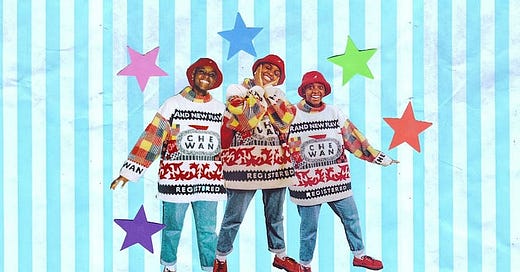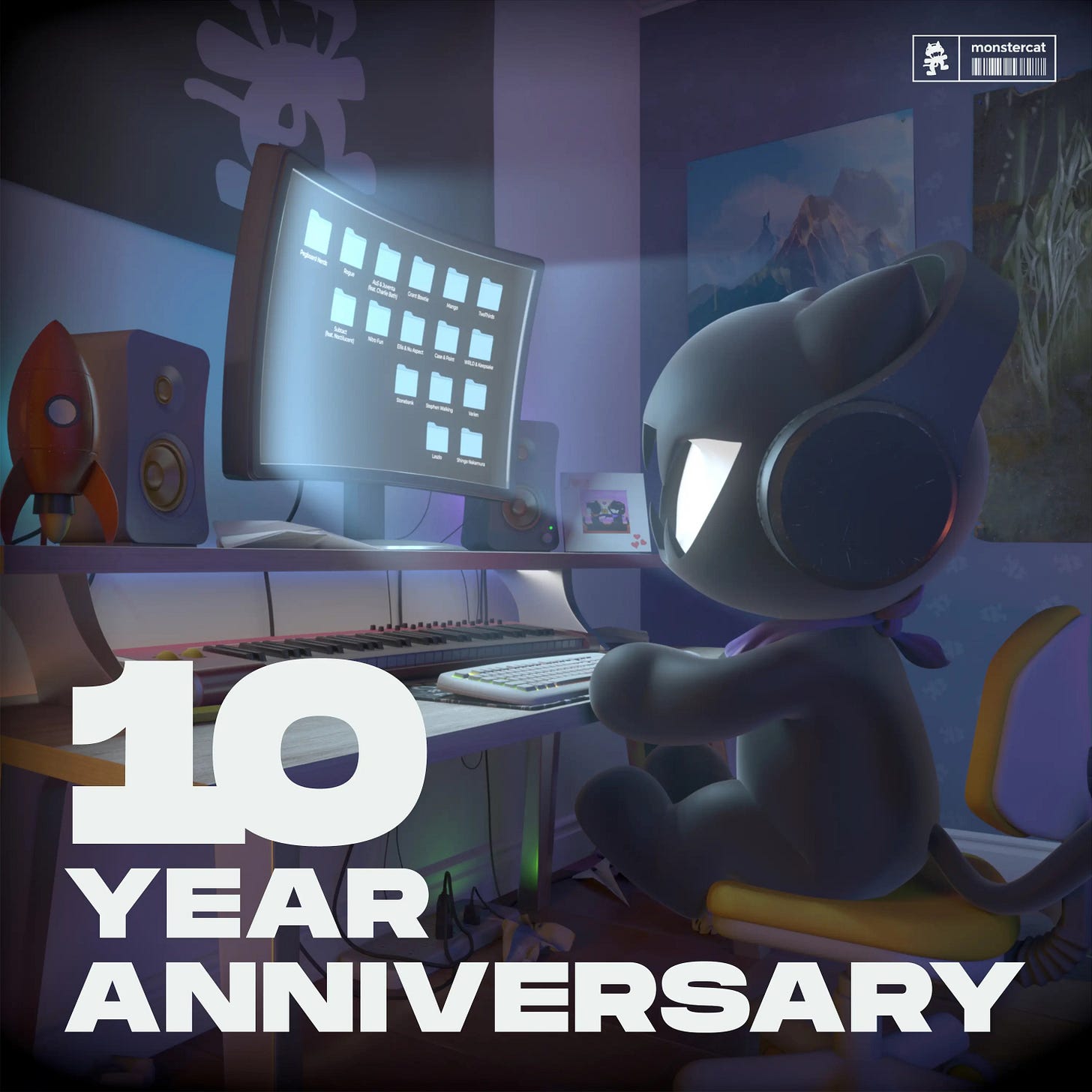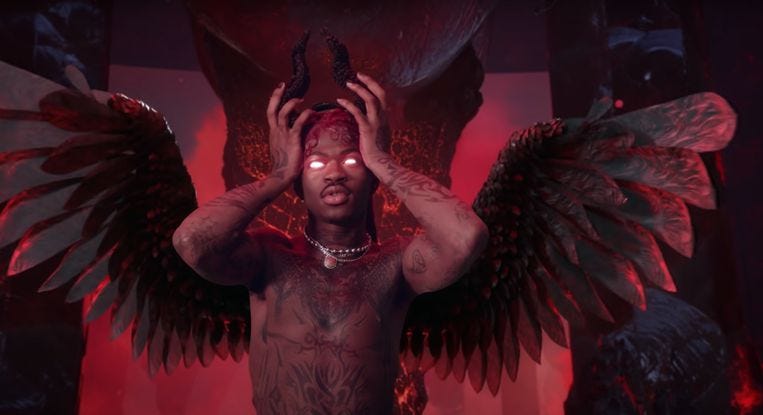✖️ A round up of TECH and X for music
The front page fallacy; The subversive joy of Lil Nas X; Monstercat has gaming in their DNA; Local Sounds, Global Culture; Sherelle launches Beautiful platform; Sonic Liberation Front
Hi everyone, it’s Maarten here. Slightly different intro than usual because there’s no article from me this week. Reason being that I’m super busy all week with painting the office and building the studio at GÂRDEN. Besides that, tomorrow is the first time in a very long time that Liedhuis, the musical theatre company I work with, will perform again, which brings with it all those last-minute organizational things that I had nearly forgotten about!
There’s two things I want to highlight specifically for you:
Bas wrote another fantastic article on DAOs, this time focusing on them as a community-led funding model for music. It’s part overview of existing use-cases and part a call-to-action to join in and start working together to change ownership structures in our business.
Over at Viberate they recently released a new report that looks at the ‘lockdown winners of Spotify. The report tells you which artists had the fastest growing fanbase throughout the pandemic year. Viberate CEO Vasja Veber told me that this type of research helps them pinpoint new and up-and-coming artists. Of course, that’s why people use Viberate, because of the data behind the artists. That is, however, not how Viberate started out. Their first idea was to book artists via blockchain technology. Right now, they’re mostly a data and research company. In the near future, though, booking gigs could get their AirBnB moment. That would be a great use-case for NFTs and blockchain.
—> if you’re into data and music I can recommend checking out Julie Knibbe’s and Jackson Bull’s writing.
And here’s what else I recommend you read.
TECH
⚓ The front page fallacy (JO7)
“Today, artists’ communities and artwork live in different places. Artists are minting and showcasing their work on one platform and promoting it and engaging with the community on others. That is, artists are building communities in spite of platforms, as opposed to on the platforms themselves. This leaves artists to only view platforms as aggregators, as opposed to enablers, whose primary function is to drive greater distribution for their artwork.”
🧬 Monstercat’s Head of Gaming talks 10 year anniversary: ”Gaming is in our DNA” (Lauren Bergin)
“We really hope to bring a new sense of depth to how people can engage with the Monstercat… He could appear in anything around you, events and whatnot, that you maybe wouldn’t have been able to see him before.”
Gavin Johnson, Head of Gaming at Monstercat
🍫 Roblox signs music partnership with Sony (Adi Robertson)
And while Monstercat hosts listening parties in their own Roblox world, Roblox itself keeps working on getting their music licensing sorted. However…
“The company declined to specify on the record whether Roblox’s deal will include a license that covers users playing Sony music in experiences — something that major social media platforms like YouTube have enabled.”
↗️ Local Sounds, Global Cultures: MENA Music Market Opportunity (Srishti Das & Kriss Thakrar)
The above title links to the download page of this MIDiA report which touches on what I think is a great territory for music. We’ve mentioned Anghami quite a bit here at MUSIC x recently with their investment and expansion drive. Here’s what I feel is the key part of the report:
“Emerging markets all have their own unique drivers that shape their development, which then impact the strategies and opportunities that arise for different streaming services. When compared to one another, however, there are similarities in how these markets have been progressing long term, and a general market progress timeline emerges.”
🧰 How the Kid LAROI went viral on TikTok (twice) (Amber Horsburgh)
You all know you want to know whether you can orchestrate virality. So go on and listen to Amber Horsburgh, who has moved her Deep Cuts over to YouTube.
X
🤗 Exploring Relationships Between Electronic Dance Music Event Participation and Well-being (James W. Cannon & Alinka E. Greasley)
This is an academic article but carries significant weight for all of us. The basic idea is simple: attending raves makes us feel good. The article helps explain why this is by analysing people’s experiences in relation to their expression of their own identity and shared feelings of community.
🇵🇸 Sonic Liberation Front: Palestine’s underground music experimentalists are resisting erasure (Shirine Saad)
“Words, glitch, rhythm, dissonance, chaos, and melody all play a role in the revolution. They tell the story of daily life under siege. “There is the sound of bullets,” sings rapper Daboor in their new “Sheikh Jarrah” track, where a heavy bass and the sound of a gun loading convey a sense of apocalyptic urgency.
In a state of occupation, making art is disobedience. Here, turning despair into sound saves people’s souls. Words save people’s souls. Words and rhymes erupt like gasps of breaths over death sentences.”
🤠 The subversive joy of Lil Nas X’s gay pop stardom (Jazmine Hughes)
A while back I wrote about how Lil Nas X fits into a current attention economy that requires performance art. The above is a great accompanying read.
🗯️ DJ-producer Sherelle: ‘I feed off people’s unexplained anger’ (Marcus Barnes)
“She is now using her status to launch a platform called Beautiful with the same ethos: to elevate Black and LGBTQ+ voices and stories that have been neglected, “wanting to make sure that anyone I work with is very aware of the history that has come before them,” she says. The initiative encompasses a record label and music education programme, which will have workshops combining technical skills with dance music history. Sherelle is having discussions with a few key brands to fund the workshops, looking for investors that won’t try to censor her and “get that there is a massive disparity with support for Black artists in electronic music.”
🗠 Everyone is an investor (Rex Woodbury)
A while back I wrote about investing in artists. Here, Rex Woodbury draws a much broader analysis of how people look for equity right now. There’s three categories of investment in his article:
Companies
Events
People
MUSIC
Yes, you already got that Sherelle track just above, but I also want to share something very different with you. Quite often, I hear people say that they don’t like classical music, or - more specifically - that difficult modern classical music. For sure, there’s a lot of fairly unlistenable composed music from the 20th Century. However, there’s also so much beautiful music in there. And so, as a response, I’ve created a playlist of accessible modern classical music.





